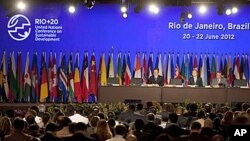The UN Conference on Sustainable Development, known as Rio+20, was held in Rio de Janeiro, Brazil June 20-22. It corresponded with the 20th anniversary of the historic Rio Conference on Environment and Development - also known as the Earth Summit. The Conference provided an historic opportunity to communicate U.S. contributions to sustainable development and to help galvanize collaborative action to stimulate growth, protect the environment and provide a healthy future for the world’s citizens. As Secretary of State Hillary Rodham Clinton said, “In the 21st century, the only viable development is sustainable development. The only way to deliver lasting progress for everyone is by preserving our resources and protecting our common environment.”
In the 20 years since the first Rio Conference, the United States has used new partnerships involving government, the private sector and civil society to tackle sustainable development challenges. The U.S. showcased several signature initiatives at Rio+20 that highlighted effective models for partnership, including the following:
1. The Climate and Clean Air Action on Solid Waste partnership brings together the Climate and Clean Air Coalition, the World Bank, the Clinton Climate Initiative/C-40 and the Global Methane Initiative to reduce methane and black carbon pollutants from municipal solid waste in leading cities around the world.
2. The Greening the Supply Chain partnership in which the U.S. Government and the companies of the Consumer Goods Forum announced a commitment to promote sustainable supply chains and reduce deforestation.
3. The U.S.-Brazil Joint Initiative on Urban Sustainability which links cities to large-scale investors and encourages new public-private partnerships to invest in sustainable infrastructure and job creation.
4. The U.S. Water Partnership’s global launch to mobilize U.S. expertise, knowledge and resources in the public and private sectors, academic institutions, foundations, and non-profit organizations to create a more water-secure world.
5. The Women and Natural Resources initiative to identify ways to engage women in areas such as fisheries, forestry, food security and health, along with strategies for promoting equal access for women at community, national and international policy levels.
6. The U.S.-Africa Clean Energy Finance Initiative wherein the State Department, the Overseas Private Investment Corporation, and the U.S. Trade and Development Agency will introduce an innovative, collaborative financing mechanism to mobilize hundreds of millions of dollars in clean energy investments in Africa and low-income countries throughout the developing world.
The United States stands ready to collaborate, innovate, and build networks across sectors and around the world to energize action on sustainable development for present and future generations.
U.S. Signature Initiatives At Rio +20
- Joan DeLuca

The U.S. showcased several signature initiatives at Rio+20 that highlighted effective models for partnership.



